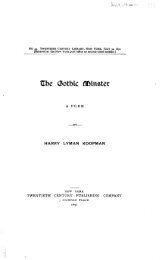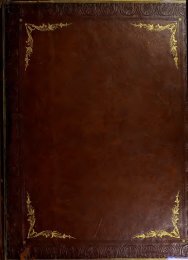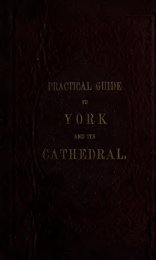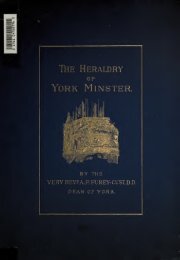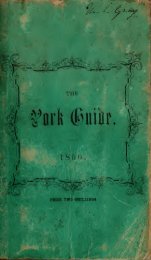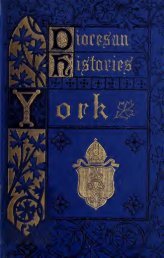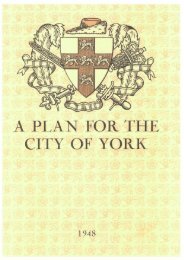Ancient_and_modern_York_a_guide
You also want an ePaper? Increase the reach of your titles
YUMPU automatically turns print PDFs into web optimized ePapers that Google loves.
2 ANCIENT AND<br />
in possession, goes to negative the supposition that cities<br />
nourished in any part of Britain previously to the Roman<br />
invasion. Caesar informs us, that the inhabitants were<br />
unacquainted with the arts <strong>and</strong> laws of civilized life,—<br />
despised the institution of marriage,*—painted their<br />
bodies,—clothed themselves in skins,—lived upon flesh<br />
<strong>and</strong> milk of animals, <strong>and</strong> neglected tillage. He adds, that<br />
the Britons knew nothing of building with stone ; but<br />
called that a city which had a wood defended by a ditch<br />
<strong>and</strong> a bank around it. Tacitus, the most accurate <strong>and</strong><br />
faithful of historians, whose father-in-law spent a great<br />
portion of his life in this country, <strong>and</strong>, as we have reason<br />
to believe, founded the city of <strong>York</strong>, describes the Britons<br />
as a fierce <strong>and</strong> savage people, running wild in woods ;<br />
<strong>and</strong> expressly mentions that Agricolaf instructed the<br />
natives how to build dwelling-houses, temples, <strong>and</strong> courts<br />
of justice. It will be admitted, that the ancient Germans<br />
were superior to the Gauls <strong>and</strong> the Britons. Now it<br />
would be taking a great deal for granted, if we assumed<br />
that cities were built by the Britons at this early period,<br />
if we find that the Germans built none. Tacitus says,|<br />
" the Germans have no regular cities, nor do they allow a<br />
continuity of houses."^f What then becomes of the<br />
romance that <strong>York</strong> flourished as a city before the time of<br />
Claudius Caesar ? Some stress is laid by Drake upon the<br />
fact, that the Britons called the place where <strong>York</strong> now<br />
st<strong>and</strong>s, Kaer. But in the Gaelic, Kaer means a seat, as<br />
well as a city; <strong>and</strong> the expression might, <strong>and</strong> no doubt did,<br />
denote a fortification. It will be sufficient to show, with<br />
how much caution we should interpret such expressions,<br />
to mention, that the places taken by Caesar are described<br />
in the Saxon Chronicle, as the chief towns of Britain ! We<br />
* Pliny, Nat. Hist. lib. xxii. chap. 2; Martial uses the expression, Coenleit<br />
Britannis ; <strong>and</strong> Ovid, Viridesque Britannos.<br />
+ Life of Agricola.<br />
t Manners of the Germans.<br />
IT Vide, Dr. Cooke Taylor's Natural History of Society.




